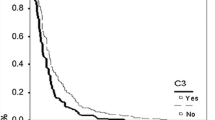Abstract
Objective
We investigated the relationship between the expression of Caspase-3, cell proliferation and apoptosis in gastric cancer and their precancerous lesions, to explore the tumorigenesis of the stomach mucosa.
Methods
Caspase-3 expression in 13 normal gastric mucosa, 6 chronic atrophic gastritis (CAG), 31 intestinal metaplasia (IM), 114 dysplasia (DYS) and 20 gastric carcinomas were investigated immunohistochemically. Cell proliferation was evaluated with anti-Ki-67 immunostaining and apoptosis was evaluated using DNA fragmentation in situ by TdT-mediated dUTP biotin nick end labeling (TUNEL) method.
Results
Caspase-3 mild-moderately positive expression was observed in most of normal superficial epithelia, its positively polar distribution in normal mucosa, CAG, IM, DYS and gastric carcinomas changed as seen in TUNEL, and so did the positive rate. Caspase-3 protein expression showed significantly positive correlation with the number of apoptotic cells labeled with TUNEL (correlation coefficient r = 0.94; P < 0.01). Ki-67 expression showed a negative but not significant correlation trend with Caspase-3 (correlation coefficient r = −0.23; P > 0.05).
Conclusion
Caspase-3 protein expression was up-regulated from CAG to IM and mild-moderate atypical dysplasia, but down-regulated in severe dysplasia and gastric carcinoma, indicating that inactivity or reduced expression of Caspase-3 is closely correlated with carcinogenesis of the stomach mucosa.
Similar content being viewed by others
References
Rugge M, Correa P, Dixon MF, et al. Gastric dysplasia: the Padova 1. international classification. Am J Surg Pathol, 2000, 24: 167–176.
Keates AC, Tummala S, Peek RM Jr, et al. Helicobacter pylori infection stimulates plasminogen activator inhibitor 1 production by gastric epithelial cells. Infect Immun, 2008, 76: 3992–3999.
Machado AM, Figueiredo C, Touati E, et al. Helicobacter pylori infection induces genetic instability of nuclear and mitochondrial DNA in gastric cells. Clin Cancer Res, 2009, 15: 2995–3002.
Trisciuoglio L, Bianchi ME. Several nuclear events during apoptosis depend on caspase-3 activation but do not constitute a common pathway. PLoS One, 2009, 4: e6234.
Yin MC, Lin CC, Wu HC, et al. Apoptotic effects of protocatechuic acid in human breast, lung, liver, cervix, and prostate cancer cells: potential mechanisms of action. J Agric Food Chem, 2009, 57: 6468–6473.
Kania J, Konturek SJ, Marlicz K, et al. Expression of survivin and caspase-3 in gastric cancer. Dig Dis Sci, 2003, 48: 266–271.
Zhang YC. Gastric dysplasia. In: Zhang YC, Kawai K, Eds. Precancerous conditions and lesions of the stomach. Berlin: Springer-Verlag, 1994. 65–84.
Lee KH, Lee HE, Cho SJ, et al. Immunohistochemical analysis of cell cycle-related molecules in gastric carcinoma: prognostic significance, correlation with clinicopathological parameters, proliferation and apoptosis. Pathobiology, 2008, 75: 364–372.
Bacqueville D, Mavon A. Caspase-3 activation and DNA damage in pig skin organ culture after solar irradiation. Photochem Photobiol, 2008, 84: 1164–1171.
Ben-Yehudah A, Aqeilan R, Robashkevich D, et al. Using apoptosis for targeted cancer therapy by a new gonadotropin releasing hormone-DNA fragmentation factor 40 chimeric protein. Clin Cancer Res, 2003, 9: 1179–1190.
Varghese J, Khandre NS, Sarin A. Caspase-3 activation is an early event and initiates apoptotic damage in a human leukemia cell line. Apoptosis, 2003, 8: 363–370.
Miyake Y, Kakeya H, Kataoka T, et al. Epoxycyclohexenone inhibits Fas-mediated apoptosis by blocking activation of pro-caspase-8 in the death-inducing signaling complex. J Biol Chem, 2003, 278: 11213–11220.
Dai ZJ, Gao J, Ji ZZ, et al. Matrine induces apoptosis in gastric carcinoma cells via alteration of Fas/FasL and activation of caspase-3. J Ethnopharmacol, 2009, 123: 91–96.
Manikandan P, Vidjaya Letchoumy P, Prathiba D, et al. Proliferation, angiogenesis and apoptosis-associated proteins are molecular targets for chemoprevention of MNNG-induced gastric carcinogenesis by ethanolic Ocimum sanctum leaf extract. Singapore Med J, 2007, 48: 645–651.
Sun Y, Chen XY, Liu J, et al. Differential caspase-3 expression in noncancerous, premalignant and cancer tissues of stomach and its clinical implication. Cancer Detect Prev, 2006, 30: 168–173.
Schlemper RJ, Kato Y, Stolte M. Review of histological classifications of gastrointestinal epithelial neoplasia: differences in diagnosis of early carcinomas between Japanese and Western pathologists. J Gastroenterol, 2001, 36: 445–456.
Fenoglio-Preiser, Carneiro F, Correa P, et al. Gastric carcinoma. In: Hamilton SR, Aalfonen LA, Eds. Pathology and genetics of tumors of the digestive system. WHO classification of tumors. Lyon: DARC Press, 2000. 47–48.
Cassaro M, Rugge M, Tieppo C, et al. Indefinite for non-invasive neoplasia lesions in gastric intestinal metaplasia: the immunophenotype. J Clin Pathol, 2007, 60: 615–621.
Author information
Authors and Affiliations
Corresponding author
Additional information
Supported by grants from the National Natural Science Foundation of China (No. 30070845, 30271607, 30600286); Climbing Scholars of the Universities in Liaoning Province (2009–2011).
Rights and permissions
About this article
Cite this article
Hu, X., Zhao, J., Yang, L. et al. Clinicopathological significance and relations of Caspase-3 expression, cell proliferation and apoptosis in gastric cancer and the precancerous lesions. Chin. -Ger. J. Clin. Oncol. 8, 665–668 (2009). https://doi.org/10.1007/s10330-009-0157-9
Received:
Revised:
Accepted:
Published:
Issue Date:
DOI: https://doi.org/10.1007/s10330-009-0157-9




